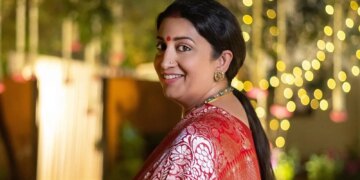Summarize this content to 100 words I was 68 when I first stepped on stage as a standup comedian in 2003. I’d never set foot in a comedy club before. I’ve always been a performer – I’ve worked as a singer, actor and musician – but all that came to an end after 9/11. I live in New York, and we watched the twin towers fall from my apartment building. For a year afterwards, nobody wanted to go out or be entertained.It was then that I started to think about comedy. I realised people needed to laugh, to enjoy themselves again, and thought that with a little training I could do it. I took a few classes, tried to work out a routine, and finally plucked up the courage to get up on stage. That first time was terrifying. I had no idea what the audience would make of me.In New York, comedians are typically young men with beards. It’s hard enough to break through as a woman, even harder as someone old enough to be their grandmother. As I stepped on stage that first time, people laughed nervously. They were clearly surprised to see me, wearing a cardigan and carrying my ukulele. I introduced myself, stated my age and tried my first joke. There was silence. But by the time I got to the third line, people were properly laughing. I was hooked.Now my sets differ. I might be on stage for 10 minutes in front of a dozen people, or my one-woman show is a full hour in front of a crowd of 100. Even today, I’m nervous before I step out. My first line is, “Hello, everybody. I’m 88 and three‑quarters years old. I’m telling you that in case I don’t make it all the way through the show.” Then people laugh and I relax.I make jokes some people would consider risque. I talk about “not having the energy for 69s”. People are surprised to hear an older person talk about sex. I’m more of a puritan in real life, but I have an onstage persona. After a show, people young and old come up to me, saying what an inspiration I am. They say they want to be as active as me when they reach my age. I’m pleased I can show that as an older person you don’t need to take a back seat in life.One thing that has surprised me is the number of young men who hit on me after a show. I might make a joke about being a cougar and they’ll stand outside afterwards, waiting to talk to me. They often ask me out and it’s not my brain they’re after.My friends think I’m mad. They don’t understand why I wouldn’t choose to take it easy. But I like engaging with the world and you’ve got to be in touch to be funny. You can’t stand on stage in New York or Paris and have out-of-date opinions or any kind of prejudice. Comedy has changed hugely in the past 20 years. It’s meant to push the boundaries, but what was considered funny then isn’t seen as funny now. Audiences have changed, too.I had heart surgery last year, aged 87, and I was back on stage the day after I came out of hospital. I was keen to get back to work, even if I was a little breathless that night. I’ve got a pacemaker and I’m on 12 pills and 1mg of steroids a day.skip past newsletter promotionSign up to Inside SaturdayThe only way to get a look behind the scenes of the Saturday magazine. Sign up to get the inside story from our top writers as well as all the must-read articles and columns, delivered to your inbox every weekend.Privacy Notice: Newsletters may contain info about charities, online ads, and content funded by outside parties. For more information see our Privacy Policy. We use Google reCaptcha to protect our website and the Google Privacy Policy and Terms of Service apply.after newsletter promotionAs an older person in comedy, I do feel as if I’ve got more to prove. I have to convince people I’m worthy of being on that stage. I think the industry, and society as a whole, treats older women horribly. I often get ignored when I first walk into comedy clubs. People assume that I’m in the wrong place and are shocked to find out I’m on the bill. Some booking agents say, “The audience isn’t gonna want to see an old lady.” Then I go and perform, and all of a sudden it’s, “Oh, you were so great.”Last year, I was recognised as the oldest female standup comedian in the world. Sadly, the title came to me only after my friend Lynn Ruth Miller, who was six months older than me, passed away. Drew Barrymore interviewed me and asked, “How does it feel?” And all I could think of was to say, “Old.”I’ve no intention of stopping comedy. I’m taking all these pills, trying to stay alive, and I hope to still be performing when I’m 100. My goal is to still be up there making people laugh. It’s hard work, but it stops me being bored. I’d only be playing golf otherwise. As told to Sophie HaydockDo you have an experience to share? Email experience@theguardian.com
[ad_1]
I was 68 when I first stepped on stage as a standup comedian in 2003. I’d never set foot in a comedy club before. I’ve always been a performer – I’ve worked as a singer, actor and musician – but all that came to an end after 9/11. I live in New York, and we watched the twin towers fall from my apartment building. For a year afterwards, nobody wanted to go out or be entertained.
It was then that I started to think about comedy. I realised people needed to laugh, to enjoy themselves again, and thought that with a little training I could do it. I took a few classes, tried to work out a routine, and finally plucked up the courage to get up on stage. That first time was terrifying. I had no idea what the audience would make of me.
In New York, comedians are typically young men with beards. It’s hard enough to break through as a woman, even harder as someone old enough to be their grandmother. As I stepped on stage that first time, people laughed nervously. They were clearly surprised to see me, wearing a cardigan and carrying my ukulele. I introduced myself, stated my age and tried my first joke. There was silence. But by the time I got to the third line, people were properly laughing. I was hooked.
Now my sets differ. I might be on stage for 10 minutes in front of a dozen people, or my one-woman show is a full hour in front of a crowd of 100. Even today, I’m nervous before I step out. My first line is, “Hello, everybody. I’m 88 and three‑quarters years old. I’m telling you that in case I don’t make it all the way through the show.” Then people laugh and I relax.
I make jokes some people would consider risque. I talk about “not having the energy for 69s”. People are surprised to hear an older person talk about sex. I’m more of a puritan in real life, but I have an onstage persona. After a show, people young and old come up to me, saying what an inspiration I am. They say they want to be as active as me when they reach my age. I’m pleased I can show that as an older person you don’t need to take a back seat in life.
One thing that has surprised me is the number of young men who hit on me after a show. I might make a joke about being a cougar and they’ll stand outside afterwards, waiting to talk to me. They often ask me out and it’s not my brain they’re after.
My friends think I’m mad. They don’t understand why I wouldn’t choose to take it easy. But I like engaging with the world and you’ve got to be in touch to be funny. You can’t stand on stage in New York or Paris and have out-of-date opinions or any kind of prejudice. Comedy has changed hugely in the past 20 years. It’s meant to push the boundaries, but what was considered funny then isn’t seen as funny now. Audiences have changed, too.
I had heart surgery last year, aged 87, and I was back on stage the day after I came out of hospital. I was keen to get back to work, even if I was a little breathless that night. I’ve got a pacemaker and I’m on 12 pills and 1mg of steroids a day.
after newsletter promotion
As an older person in comedy, I do feel as if I’ve got more to prove. I have to convince people I’m worthy of being on that stage. I think the industry, and society as a whole, treats older women horribly. I often get ignored when I first walk into comedy clubs. People assume that I’m in the wrong place and are shocked to find out I’m on the bill. Some booking agents say, “The audience isn’t gonna want to see an old lady.” Then I go and perform, and all of a sudden it’s, “Oh, you were so great.”
Last year, I was recognised as the oldest female standup comedian in the world. Sadly, the title came to me only after my friend Lynn Ruth Miller, who was six months older than me, passed away. Drew Barrymore interviewed me and asked, “How does it feel?” And all I could think of was to say, “Old.”
I’ve no intention of stopping comedy. I’m taking all these pills, trying to stay alive, and I hope to still be performing when I’m 100. My goal is to still be up there making people laugh. It’s hard work, but it stops me being bored. I’d only be playing golf otherwise.
As told to Sophie Haydock
Do you have an experience to share? Email experience@theguardian.com
[ad_2]
Source link







